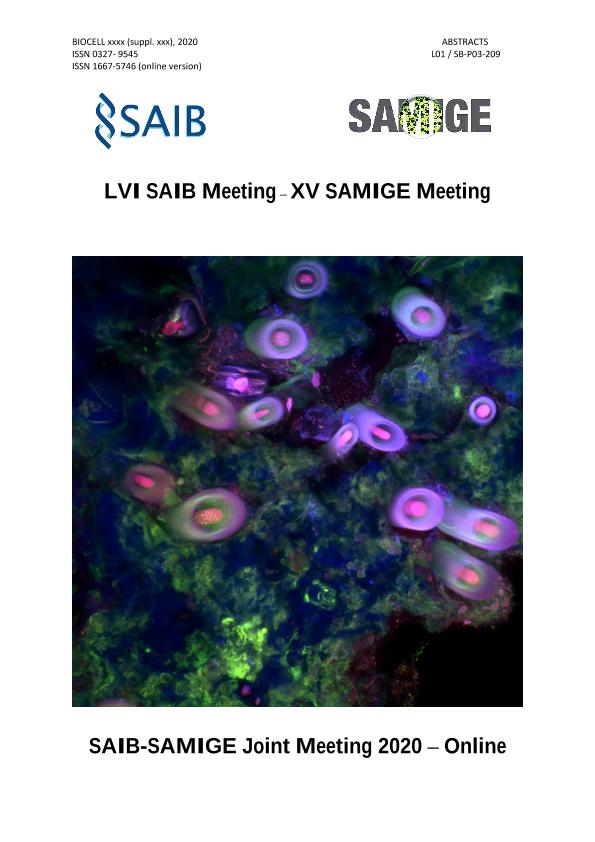Mostrar el registro sencillo del ítem
dc.contributor.author
Grossi, Cecilia Eugenia María

dc.contributor.author
Santin, Franco

dc.contributor.author
Quintana Arrúa, Silverio Andrés

dc.contributor.author
Fantino, Elisa Inés

dc.contributor.author
Ulloa, Rita Maria

dc.date.available
2023-06-28T12:04:56Z
dc.date.issued
2020
dc.identifier.citation
Calcium-dependent protein kinase 2 is an early player in the salt stress response; LVI Annual Meeting Argentine Society for Biochemistry and Molecular Biology; XV Annual Meeting Argentinean Society for General Microbiology; Ciudad Autónoma de Buenos Aires; Argentina; 2020; 140-140
dc.identifier.issn
0327-9545
dc.identifier.uri
http://hdl.handle.net/11336/201591
dc.description.abstract
Potato is the most important horticultural crop in Argentina. It is well adapted to many environmental conditions but certain abiotic stresses, such as salinity, cause significant reductions in growth and yield. Understanding how potato plants perceive and combat salt stress is fundamental to develop salt-tolerant plants that could expand actual crop frontiers. When exposed to NaCl, plants exhibit fast and transient increases in cytosolic Ca2+ within seconds; this early and prominent feature needs to be decoded by calcium sensors that transduce this signal into physiological responses. In greenhouse potato plants irrigated with high salt (50 or 150 mM NaCl), shoot and root length, and shoot biomass showed a significant reduction, and photosynthetic parameters were strongly affected compared to control plants. In this report, we carried out an in silico analysis of the cis-responsive elements found in the promoter sequences of three CDPK isoforms: StCDPK1, StCDPK2, and StCDPK3. Numerous sites related to abiotic stress were predicted in the three promoters; however, these were more abundant in StCDPK2. In accordance with this, GUS activity increased in the root tips of ProStCDPK2:GUS potato plants upon salt stress. RT-qPCR assays confirmed its early induction in in vitro potato plants after 2 h of high salt exposure. Moreover, StCDPK2 expression was induced when greenhouse plants were exposed to a dynamic salt stress condition. Based on these data, we produced 35S:StCDPK2 plants to further analyze the role of this kinase under salt stress conditions. As inferred from biometric data and chlorophyll content, plants that over-express StCDPK2 were more tolerant than WT plants when exposed to high salt in vitro. Over-expressing plants showed enhanced expression of WRKY6 and ERF5 transcription factors under control conditions and reduced accumulation of peroxide and higher catalase activity under salt conditions. Our results show that StCDPK2 is an early player in the salt stress response.
dc.format
application/pdf
dc.language.iso
eng
dc.publisher
Tech Science Press

dc.rights
info:eu-repo/semantics/openAccess
dc.rights.uri
https://creativecommons.org/licenses/by-nc-sa/2.5/ar/
dc.subject
StCDPK2
dc.subject
Calcium-dependent protein kinase
dc.subject
Solanum tuberosum
dc.subject.classification
Bioquímica y Biología Molecular

dc.subject.classification
Ciencias Biológicas

dc.subject.classification
CIENCIAS NATURALES Y EXACTAS

dc.title
Calcium-dependent protein kinase 2 is an early player in the salt stress response
dc.type
info:eu-repo/semantics/publishedVersion
dc.type
info:eu-repo/semantics/conferenceObject
dc.type
info:ar-repo/semantics/documento de conferencia
dc.date.updated
2022-11-01T23:04:58Z
dc.identifier.eissn
1667-5746
dc.journal.volume
30
dc.journal.number
Suppl. 30
dc.journal.pagination
140-140
dc.journal.pais
Estados Unidos

dc.journal.ciudad
Henderson
dc.description.fil
Fil: Grossi, Cecilia Eugenia María. Consejo Nacional de Investigaciones Científicas y Técnicas. Instituto de Investigaciones en Ingeniería Genética y Biología Molecular "Dr. Héctor N. Torres"; Argentina
dc.description.fil
Fil: Santin, Franco. Consejo Nacional de Investigaciones Científicas y Técnicas. Instituto de Investigaciones en Ingeniería Genética y Biología Molecular "Dr. Héctor N. Torres"; Argentina
dc.description.fil
Fil: Quintana Arrúa, Silverio Andrés. Consejo Nacional de Investigaciones Científicas y Técnicas. Instituto de Investigaciones en Ingeniería Genética y Biología Molecular "Dr. Héctor N. Torres"; Argentina
dc.description.fil
Fil: Fantino, Elisa Inés. Consejo Nacional de Investigaciones Científicas y Técnicas. Instituto de Investigaciones en Ingeniería Genética y Biología Molecular "Dr. Héctor N. Torres"; Argentina
dc.description.fil
Fil: Ulloa, Rita Maria. Consejo Nacional de Investigaciones Científicas y Técnicas. Instituto de Investigaciones en Ingeniería Genética y Biología Molecular "Dr. Héctor N. Torres"; Argentina. Universidad de Buenos Aires. Facultad de Ciencias Exactas y Naturales. Departamento de Química Biológica; Argentina
dc.relation.isreferencedin
info:eu-repo/semantics/reference/hdl/https://ri.conicet.gov.ar/handle/11336/139095
dc.relation.alternativeid
info:eu-repo/semantics/altIdentifier/url/http://www.samige.org.ar/admin/news/files/170-TSP_BIOCELL_42376.pdf
dc.relation.alternativeid
info:eu-repo/semantics/altIdentifier/url/https://saib.org.ar/archivos/biocell-45.pdf
dc.conicet.rol
Autor

dc.conicet.rol
Autor

dc.conicet.rol
Autor

dc.conicet.rol
Autor

dc.conicet.rol
Autor

dc.coverage
Nacional
dc.type.subtype
Reunión
dc.description.nombreEvento
LVI Annual Meeting Argentine Society for Biochemistry and Molecular Biology; XV Annual Meeting Argentinean Society for General Microbiology
dc.date.evento
2020-11-02
dc.description.ciudadEvento
Ciudad Autónoma de Buenos Aires
dc.description.paisEvento
Argentina

dc.type.publicacion
Journal
dc.description.institucionOrganizadora
Sociedad Argentina de Investigaciones en Bioquímica y Biología Molecular
dc.description.institucionOrganizadora
Sociedad Argentina de Microbiología General
dc.source.revista
Biocell

dc.date.eventoHasta
2020-11-05
dc.type
Reunión
Archivos asociados
